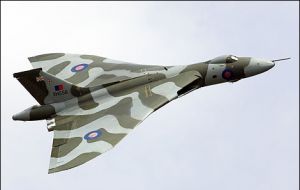MercoPress. South Atlantic News Agency
Falklands’ war restored Vulcan bomber will take final flight next year
 Soaring maintenance costs of the Avro Vulcan XH558, the only one still flying make it impossible to keep her in the air. Nevertheless since restoration she participated in over sixty air shows
Soaring maintenance costs of the Avro Vulcan XH558, the only one still flying make it impossible to keep her in the air. Nevertheless since restoration she participated in over sixty air shows Britain's only flying Cold War Vulcan bomber and which participated in Operation Black Buck bombing Stanley airport during the Falkland Islands conflict of 1982, will take its final flight next year before being grounded because of soaring restoration costs, according to reports in the UK media.
After a multimillion-pound fundraising scheme, Avro Vulcan XH558 was restored in 2007 and given a certificate of airworthiness before appearing at more than 60 air shows. But The Vulcan to the Sky Trust has announced that 2013 will be the final flying season for the aircraft based at Doncaster's Robin Hood Airport.
At the height of the Cold War, Vulcan bombers carrying nuclear missiles were a key part of Britain's deterrent.
The only action that XH558 saw was in the Falklands War in 1982 when it flew 8.000 miles to bomb the runway at Port Stanley and planes on the ground during the Argentine invasion of the Falklands.
Since the restoration the charity estimates that more than ten million people have seen the aircraft, including three million when it flew as part of the Queen's 2012 Diamond Jubilee celebrations. But the charity has admitted that it would be too expensive to continue flying the Vulcan beyond next year.
Trust chief executive Dr Robert Pleming said: “All Vulcans have a finite safe flying life and XH558 is already significantly beyond the hours flown by any other aircraft of her type. At the end of next year, she will need a £200,000 modification to her wings to increase her flying life”.
As well as complex and expensive wing modifications there is also concern about the Vulcan's jet engines.
Andrew Edmondson, engineering director for XH558 said: “From the start of the 2014 season, it is unlikely that we could accommodate any engine failures and that even without any technical problems, soon our set of engines would be out of life.
“There are no more airworthy engines available, and refurbishment would be so difficult and costly that there is no possibility that it will happen”.
Also because of the closure of aviation suppliers since the aircraft's maiden flight in August 1952 the cost of re-manufacturing or refurbish parts would be too high.
Mr Edmonson added: “We know, for example, that the set-up costs to remanufacture a main wheel are more than £70,000. If the approved engineering drawings are no longer available, it can be practically impossible given any amount of money”.
In a letter to the Trust supporters, Dr. Pleming said: “Next year will be the last opportunity anyone will have, anywhere in the world, to see a Vulcan in the air.
“The Vulcan to the Sky Trust's aspiration is that when XH558's flying life is over, she will become the centre-piece of a new project that will inspire and train new generations of youngsters to become engineers and technicians, helping to solve the UK's significant shortfall in the number of talented young people entering technical careers”.'
Michael Trotter, the Trust's director, said: “XH558 will be maintained in excellent running order and will continue to delight her supporters with fast taxi runs while developing further her role in education as the centre-piece of an exciting new type of inspirational engineering education centre”.
The Vulcan strategic bomber was used by the RAF between 1956 and 1984, and formed the backbone of Britain's airborne nuclear deterrent during the Cold War. Manufacturers A V Roe & Co (Avro) named the aircraft 'Vulcan' after the Roman god of fire.
The plane initially carried the UK's first nuclear weapon, the Blue Danube gravity bomb, and was equipped to carry it to Russia, an exercise in deterrence.
It was also capable of conventional bombing missions, and played a vital role in Operation Black Buck during the Falklands War in 1982. The Black Buck combat missions saw the planes fly 3,889 miles from Ascension Island to Stanley on the Falkland Islands.
On May 1st 1982, a single Vulcan flew over Port Stanley and bombed the airfield there, achieving a direct hit which rendered it unusable by fighter aircraft. The plane was retired by the RAF in 1984.




Top Comments
Disclaimer & comment rules-

-

-

Read all comments“On May 1st 1982, a single Vulcan flew over Port Stanley and bombed the airfield there”
Oct 17th, 2012 - 05:14 pm 0Usless bloody UK, they bomb their own air field = true wimps.
You never have the balls to bomb my Rio Gallegos air field.
Keep your falklands.
@1 - Idiot! The airfield was in Argentine hands at the time and the bombing stopped them using it for their fighter jets, which were withdrawn to the Argentine mainland for fear of further bombings, just the sort of wimpish acts you would expect from cowards.
Oct 17th, 2012 - 05:23 pm 0Oh and yes we will keep the Falklands thanks.
how strange is that my eyes see Zebra skinned aircraft could fall prey to lions easily.
Oct 17th, 2012 - 05:24 pm 0Commenting for this story is now closed.
If you have a Facebook account, become a fan and comment on our Facebook Page!